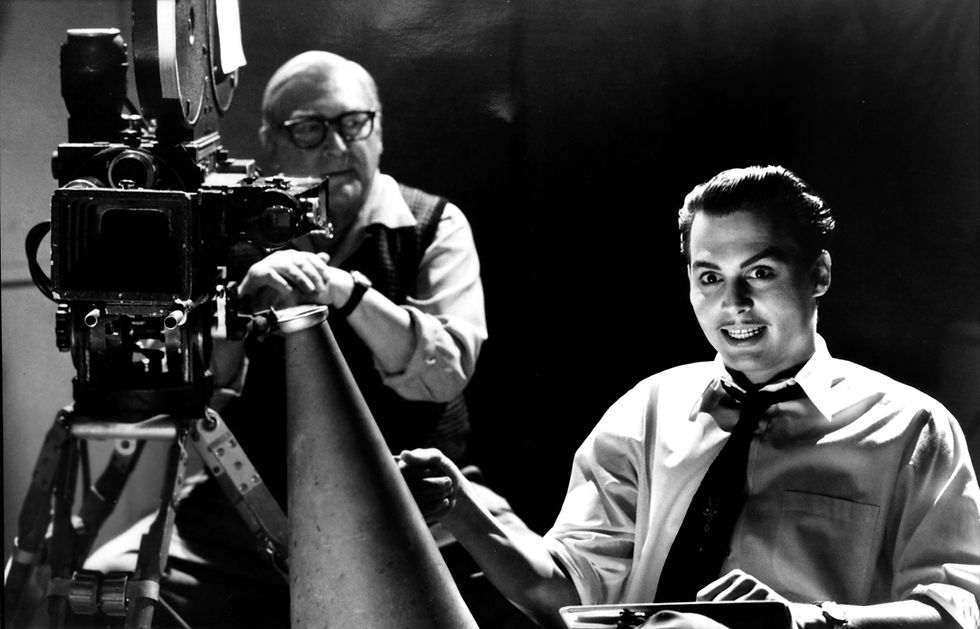Johnny Depp
- Soames Inscker

- Jul 21, 2025
- 4 min read
Updated: Dec 16, 2025

The Chameleon of Modern Cinema
Johnny Depp is one of the most enigmatic and transformative actors of his generation. Known for his uncanny ability to disappear into roles, he has cultivated a career defined by risk-taking, artistic boldness, and a deep affinity for outsider characters. With a filmography spanning decades, Depp has become synonymous with eccentricity, reinvention, and complex portrayals that push the boundaries of mainstream cinema.
Early Life and Rise to Fame
John Christopher Depp II was born on June 9, 1963, in Owensboro, Kentucky. His family moved frequently, and Depp often felt unsettled in his youth. He turned to music early on, playing in several bands, and initially pursued a career as a rock guitarist. It was through a chance introduction by Nicolas Cage that Depp began auditioning for acting roles.
His first major break came with A Nightmare on Elm Street (1984), in which he played Glen, a teen whose death scene remains iconic in horror history. But true stardom arrived when he was cast as Officer Tom Hanson in the television series 21 Jump Street (1987–1990). The show made him a teen idol, a label Depp quickly came to resent. He soon sought out roles that would distance him from heartthrob status and establish him as a serious actor.
Collaboration with Tim Burton and Defining Roles
Depp’s career-defining partnership with director Tim Burton began with Edward Scissorhands (1990), a poetic, melancholy fable about an artificial man with scissors for hands. Depp's performance, largely nonverbal and emotionally resonant, proved his extraordinary range and launched a lifelong collaboration.
Their partnership yielded a series of acclaimed and visually distinctive films:
Ed Wood (1994), where Depp portrayed the optimistic yet inept filmmaker with surprising tenderness.
Sleepy Hollow (1999), a stylish gothic horror adaptation of the Washington Irving tale.
Charlie and the Chocolate Factory (2005), where his eerie, Michael Jackson-esque Willy Wonka polarized audiences.
Sweeney Todd: The Demon Barber of Fleet Street (2007), which earned Depp an Academy Award nomination and showcased his musical talents.
Depp's work with Burton revealed his affinity for playing misfits, dreamers, and loners—characters on the margins of society who often reflect deeper emotional truths.
Mainstream Stardom: Captain Jack Sparrow
Depp’s most commercially successful role came in 2003 with the release of Pirates of the Caribbean: The Curse of the Black Pearl. As Captain Jack Sparrow, he reinvented the swashbuckling pirate archetype, blending Keith Richards' swagger with vaudeville flair. What could have been a one-note caricature became one of the most beloved and original performances in blockbuster history.
The role earned Depp his first Academy Award nomination for Best Actor and spawned a multi-billion-dollar franchise. While later installments received mixed reviews, Depp’s portrayal remained a cultural touchstone, earning him global fame and acclaim.
Diverse Filmography and Creative Risks
Depp’s versatility has seen him take on a wide range of genres and characters:
Donnie Brasco (1997), where he gave a grounded, emotionally nuanced performance as an undercover FBI agent opposite Al Pacino.
Fear and Loathing in Las Vegas (1998), playing journalist Hunter S. Thompson in a hallucinogenic tour de force.
Finding Neverland (2004), a poignant role as J.M. Barrie that earned him another Oscar nomination.
Public Enemies (2009), portraying real-life gangster John Dillinger with charisma and stoicism.
Black Mass (2015), in which he disappeared under prosthetics to play the terrifying crime boss Whitey Bulger.
Throughout his career, Depp has displayed an unwavering commitment to his craft, often choosing roles that challenge audience expectations and subvert typical Hollywood heroism.
Personal Life and Public Controversy
In recent years, Depp's personal life has attracted as much attention as his acting. His high-profile legal battle with ex-wife Amber Heard, marked by allegations of abuse and counterclaims, culminated in a widely publicised 2022 defamation trial. The verdict largely favoured Depp, and he has since begun a measured return to public life.
These events had a significant impact on his professional reputation, with major studios distancing themselves from him during the controversy. Nonetheless, many fans and supporters remained loyal, seeing him as a victim of public mischaracterisation. His 2023 appearance at the Cannes Film Festival with the French-language film Jeanne du Barry, in which he portrayed King Louis XV, marked a symbolic comeback.
Legacy and Impact
Johnny Depp's legacy is that of a fearless performer and cinematic chameleon. He helped redefine what it means to be a leading man in Hollywood—embracing oddity, vulnerability, and theatricality in an industry often dominated by convention. He has worked with some of the world’s most respected directors, including Tim Burton, Jim Jarmusch, Terry Gilliam, and Michael Mann, and has received numerous awards and nominations.
Depp's influence can be seen in the generations of actors inspired by his fearless choices and emotional honesty. He remains a beloved figure to millions for his portrayals of dreamers, rebels, and broken souls who nevertheless strive for meaning and connection.
Conclusion
Johnny Depp is one of cinema’s great shapeshifters. From the hauntingly gentle Edward Scissorhands to the flamboyant Jack Sparrow, from real-life gangsters to mythical mad hatters, he has inhabited a kaleidoscope of characters with unparalleled depth and daring. Despite the turbulence of his personal life, his contributions to film are undeniable, and his legacy as a daring, transformative actor continues to captivate audiences around the world.




